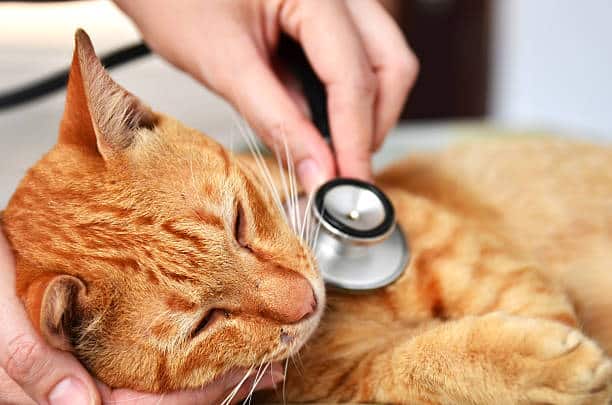Cat Allergy Treatment at Coastal Veterinary Care
Our comprehensive approach to cat allergy care blends advanced diagnostic tools with compassionate, individualized treatment.
Diagnostic Process
We begin with a full physical exam and a review of your cat’s symptoms, health history, and possible triggers. Common cat allergy symptoms, such as itchy skin, watery eyes, runny nose, or nasal congestion, help us determine whether food allergy, environmental allergies, or flea allergy dermatitis may be involved.
To pinpoint the cause, we use specialized allergy testing. This may include a blood test to evaluate the immune system’s response to specific allergens or intradermal skin testing to identify airborne allergens, pet dander, or food-related triggers. With digital cytology technology, we can often provide same-day lab results for faster answers.
Treatment Options
We offer multiple treatment approaches tailored to your pet’s specific needs:
Medications for Immediate Relief:
- Antihistamines for mild allergic reactions
- Targeted therapies like Apoquel and Cytopoint for chronic itching
- Steroids for severe flare-ups when other treatments aren’t sufficient
Long-Term Management:
- Allergen-specific immunotherapy, including allergy shots or sublingual drops
- Prescription diets specifically formulated for dogs with food allergies
- Topical treatments and medicated baths to soothe irritated skin
- Fatty acid supplements to support healthy skin barrier function
Environmental Management:
- Practical strategies to limit exposure to dust mites, cat dander, and other environmental allergens
- Recommendations for using a HEPA filter, frequent cleaning, and safe home adjustments to reduce airborne allergens and pet dander buildup
Pet allergies are a common but challenging condition for cats and their owners in Myrtle Beach. Cats, just like people, can develop allergies that cause discomfort and health issues. From itchy skin to watery eyes, allergy symptoms can affect your cat’s quality of life. While there is no cure for allergies, proper treatment can significantly improve your cat’s comfort and overall well-being.
With the right combination of allergy testing, treatment options, and ongoing care, most cats experience lasting relief from allergic symptoms and a better quality of life. Visit us at Coastal Veterinary Care to receive the attention and treatment your pet deserves.
Common Signs of Allergies in Cats
Because allergic reactions in cats can present in multiple ways, early recognition of your cat’s symptoms is key to avoiding complications and managing allergens. Here are some symptoms to watch for:
-
-
- Itchy skin or frequent scratching
- Red, inflamed patches on the cat’s skin
- Watery eyes or runny nose
- Frequent ear infections or head shaking
- Hair loss from excessive grooming
- Sneezing or nasal congestion
- Coughing or difficulty breathing
-
These allergy symptoms often affect a cat’s skin, salivary glands, and respiratory system. In severe cases, secondary infections can develop, making early diagnosis and care essential to prevent the gradual reaction from becoming chronic.

Types and Causes of Cat Allergies
Cats can develop allergies to several common triggers, and understanding the different types helps our Myrtle Beach veterinary team create the most effective treatment plan for your pet:
Environmental Allergies (Atopic Dermatitis)
Environmental allergies are one of the leading causes of skin allergies in cats, with airborne allergens and pet dander being especially common in our coastal climate.
-
- Airborne allergens like pollen, dust mites, and mold can trigger allergic rhinitis and nasal congestion
- Cat dander and pet dander from other animals can worsen allergic symptoms
- Environmental allergies may also cause atopic dermatitis and itchy skin
Atopic dermatitis often flares during certain seasons, as a cat’s immune system reacts to environmental allergens like pollen, dust mites, and cat dander.
Food Allergies
A food allergy can develop in cats at any stage of life, often leading to both cat allergy symptoms on the skin and digestive upset.
- Reactions to proteins in the diet can cause digestive upset or skin allergies
- An elimination diet or hypoallergenic diet may be recommended to identify triggers
- Food allergies often mimic other allergy symptoms, making testing important
Unlike seasonal allergies, food allergy symptoms occur year-round, requiring an elimination diet or hypoallergenic diet to pinpoint the cause.
Flea Allergy Dermatitis (FAD)
Flea allergy dermatitis is one of the most common forms of allergic dermatitis in cats, especially in humid regions like Myrtle Beach.
- Flea allergy dermatitis is one of the most common allergic dermatitis conditions in cats
- Even a single flea bite can cause an intense allergic reaction
- Contact with certain materials or chemicals can also irritate a cat’s skin
In coastal climates, humidity increases flea activity, making year-round flea prevention essential to reduce flea allergy dermatitis and protect against secondary allergic reactions.
What to Do if You Suspect Allergies
If you notice allergy symptoms, don’t delay care. Early evaluation helps prevent severe reactions and long-term issues. Steps to take include:
-
-
-
- Schedule an exam with our Myrtle Beach veterinary team
- Track your cat’s symptoms, including frequency and severity
- Note any changes in environment, diet, or grooming products
- Avoid over-the-counter medication without veterinary guidance
- Seek immediate care if your cat experiences difficulty breathing or widespread skin irritation
-
-
Our same-day lab results and advanced diagnostic technology help us quickly identify the cause of your cat’s symptoms and begin appropriate treatment.

Managing and Preventing Cat Allergies
Help reduce your cat’s symptoms and improve daily comfort with these simple steps for managing cat allergies at home:
-
-
- Regular grooming helps reduce cat dander and keeps the cat’s skin healthy, lowering the risk of skin allergies and flare-ups
- Year-round flea prevention is essential in Myrtle Beach’s humid climate to protect against flea allergy dermatitis and other allergic reactions
- Monitor your cat’s symptoms closely, watching for itchy skin, redness, or signs of allergic dermatitis that may point to ongoing environmental allergies
- Improve air quality at home by using a HEPA filter, washing bedding often, and reducing airborne allergens like dust mites and pet dander
- Dietary management may include an elimination diet or hypoallergenic diet to address food allergy symptoms and support your cat’s immune system
-
Proactive management significantly reduces the severity of allergic reactions and helps maintain your pet’s comfort between veterinary visits.
FAQs
Can cats really develop allergies like humans?
Yes, cats can develop allergies to environmental allergens, food proteins, and flea bites. These reactions can cause itchy skin, watery eyes, and respiratory issues.
How do I know if my cat’s symptoms are from allergies or another condition?
Allergy testing, blood tests, and a veterinary exam help differentiate allergies from infections or other illnesses. Clinical immunology plays an important role in finding the root cause.
What treatment options are available for cat allergies?
Treatment may include medication, allergy shots, hypoallergenic diets, topical care, and strategies to reduce allergens at home.
Can cat allergies cause respiratory problems like sneezing or nasal congestion?
Yes. Cats with environmental allergies may develop allergic rhinitis, leading to sneezing, stuffy nose, or even difficulty breathing. Managing airborne allergens such as dust mites, pet dander, and pollen is important for relief.
How do vets determine if my cat has a food allergy or another type of allergy?
Veterinarians often use a combination of allergy testing and an elimination diet or hypoallergenic diet to identify food allergy symptoms. Since signs can overlap with skin allergies or environmental allergens, a careful diagnostic process helps pinpoint the cause.
Why Choose Coastal Veterinary Care for Cat Allergy Treatment
At Coastal Veterinary Care in Myrtle Beach, we are committed to compassionate, professional care for every pet. Our team offers same-day lab results, digital cytology, and advanced allergy testing to provide answers quickly. We stay current with the latest veterinary clinical immunology research to provide effective solutions tailored to your cat’s needs.
Our fear-free certified staff focuses on comfort, education, and long-term health, so you and your cat can enjoy a lifetime of companionship without the stress of untreated allergies.
